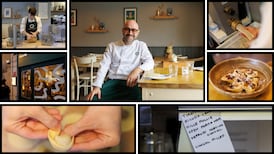LIBERIA: Two years ago it was a bloody power struggle which consumed the nation but, with the help of Irish troops, presidential elections are due to take place, Bill Corcoran reports in Monrovia
"All men have failed Liberia. Let's try an experienced woman this time," reads the slogan splashed across the T-shirt of a supporter of presidential candidate Ellen Johnson Sirleaf.
The 66-year-old candidate is one of two women running for election in the country's presidential elections, and if elected she will become the first ever female African head of state.
With less than a week to go to the west African country's October 11th polling day, political activism appears to have replaced the brutality that gripped the streets of Monrovia until just over two years ago.
Back in 2003, Monrovia's residents were under siege, as two rebel groups, Liberians United for Reconciliation and Democracy and the Movement for Democracy in Liberia, launched attack after attack on the city in an effort to oust the country's incumbent dictator Charles Taylor.
But ultimately, none of the attacks were successful, and it was not until considerable political pressure was applied by international governments on Taylor that he eventually agreed to step down as president and go into exile in Nigeria, where he remains today. Since then an interim government made up of the two rebel groups and the former government has been in place. And, a United Nations Mission to Liberia (UNMIL) has been established in the country that was formed by freed African slaves from America in the 1820s.
The 15,000 peacekeepers - including around 430 Irish troops who make up the mission's rapid reaction force - are deployed across the country where they have been assisting in the disarmament, demobilisation and re-integration of ex-combatants into society.
But more importantly, the mission has been providing the necessary security to allow a free and fair electoral process to take place. During Liberia's last elections in 1997, Charles Taylor famously said the only alternative to his presidency was war.
But those scenes of violence, epitomised by images of drugged child soldiers totting semi-automatic weapons, which followed the flawed election have now been replaced by ones of political expression in which individuals are free to support anyone of the 22 presidential candidates.
From early morning supporters of Ellen Johnson Sirleaf, one of the main contenders for the presidency, and her Unity Party members began marching towards the Antoinette Tubman Stadium in central Monrovia where the candidate's final election rally was to take place.
Mary Weah started her march from the Freeport area of the city and danced and sang her way along with tens of thousands of other supporters to the stadium. Along the way she passed numerous signs warning Liberians of the consequences of their actions. "It will kill us or liberate us, so vote wisely," claimed the messages that draw upon Liberia's bloody past.
In total, the 14 years of war that followed Taylor's takeover in 1990 after the death of the previous dictator Samuel Doe, left 200,000 people dead. A further 500,000 of the country's three million inhabitants were also internally displaced.
"Its time for the Liberian people to lead a better life. We want the people to be free, so I will support whichever candidate wins. But I want Ellen [ Johnson Sirleaf] to win; she will be good for the country because she is very smart," said Mary Weah in a creole accent.
Although a woman in a traditionally male dominated society, Johnson Sirleaf is considered a good bet for president. She used to be a senior UN official as well as an economist with the World Bank, and has been active in Liberian politics since the 1970s.
Many Liberians say the gender issue does not matter anymore and they will vote for whoever will ensure the provision of electricity and running water.
"I have operated, succeeded and excelled in a man's world in every area or profession I have been in," Johnson Sirleaf has repeatedly told the press.
But she will face stiff competition from the legendary George Weah who has a strong support base amongst the country's youth who recall his days as the European, world and FIFA footballer of the year in 1995.
Although his opponents point to the fact that he is poorly educated, he believes he can be a unifying force amongst his people, who can stave off a return to the country's violent past.










